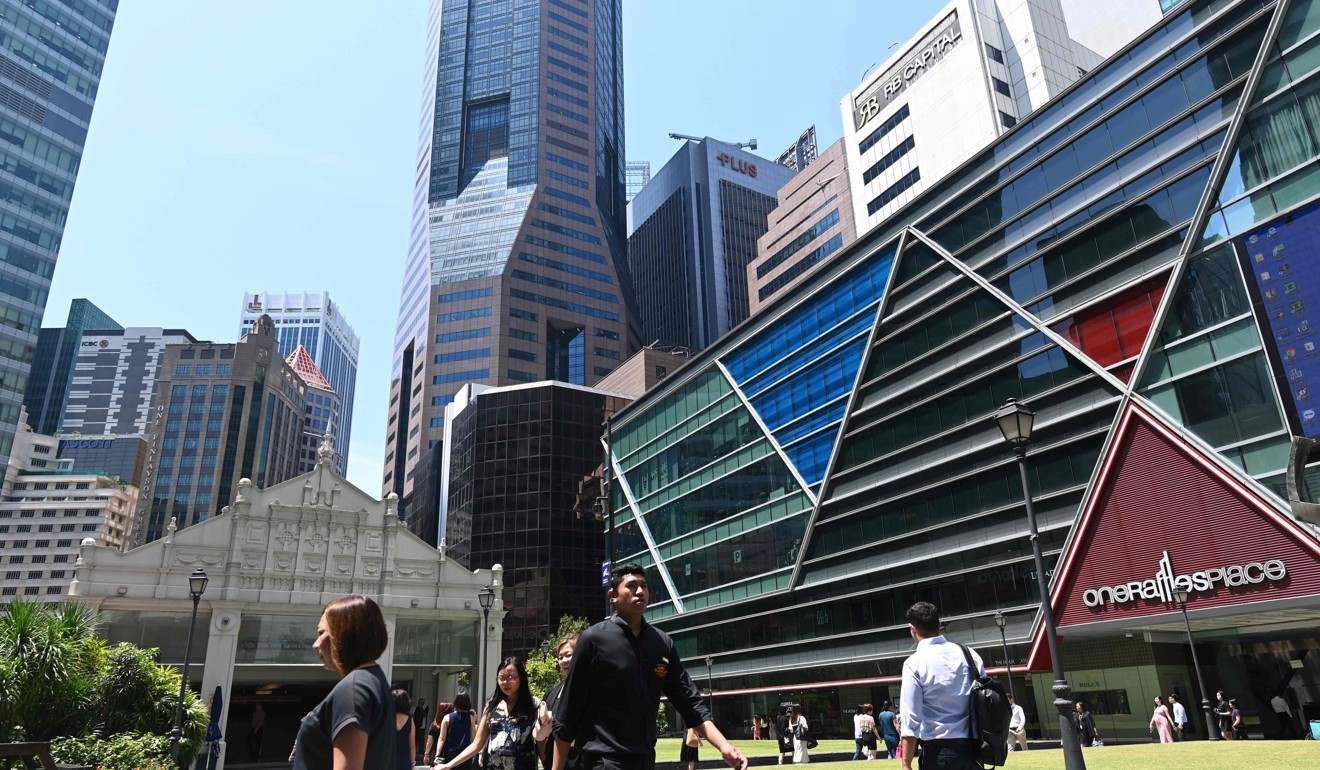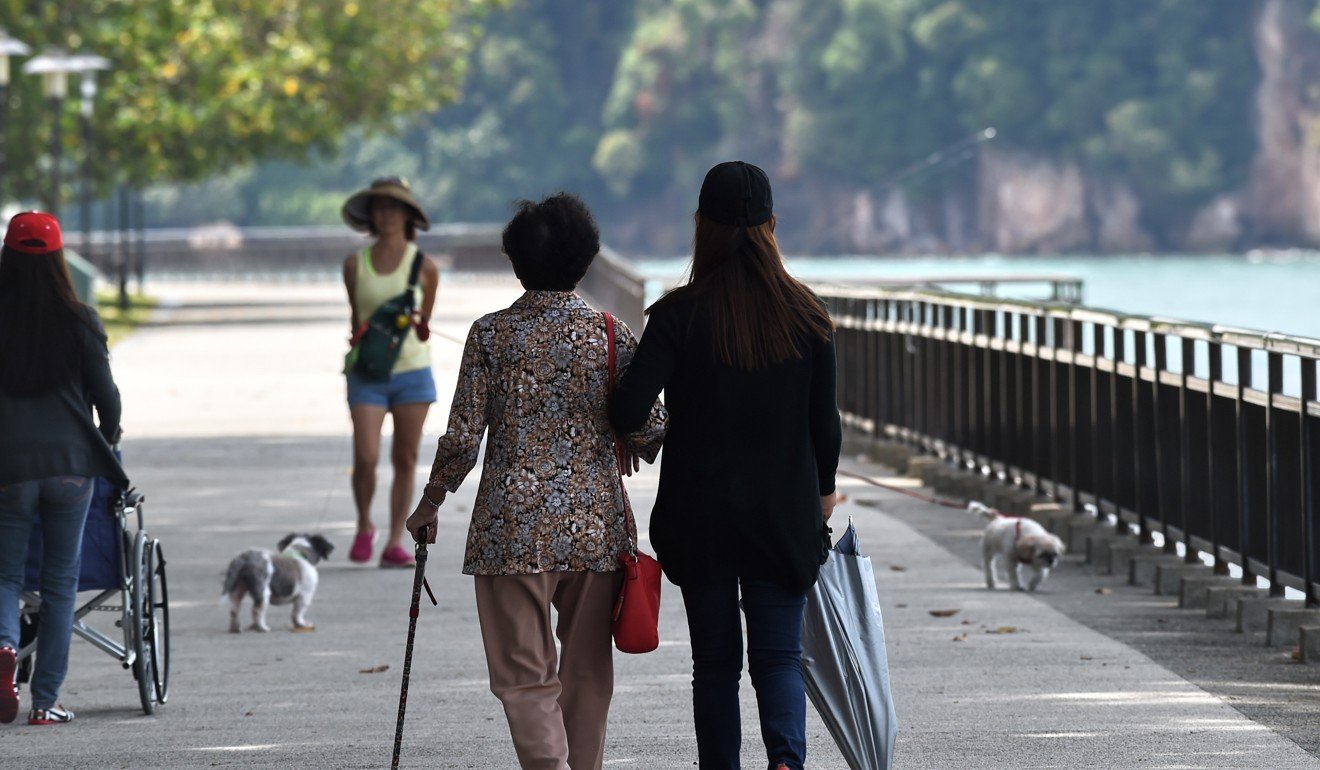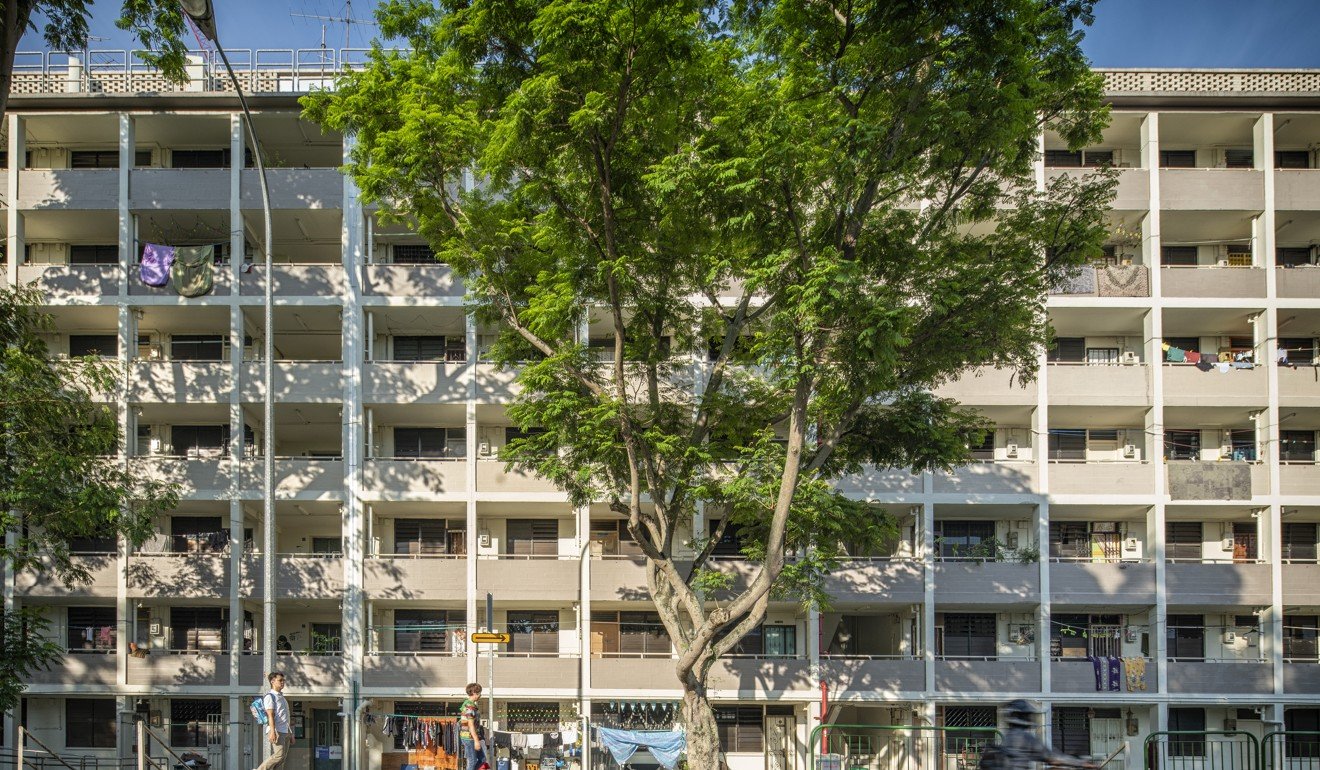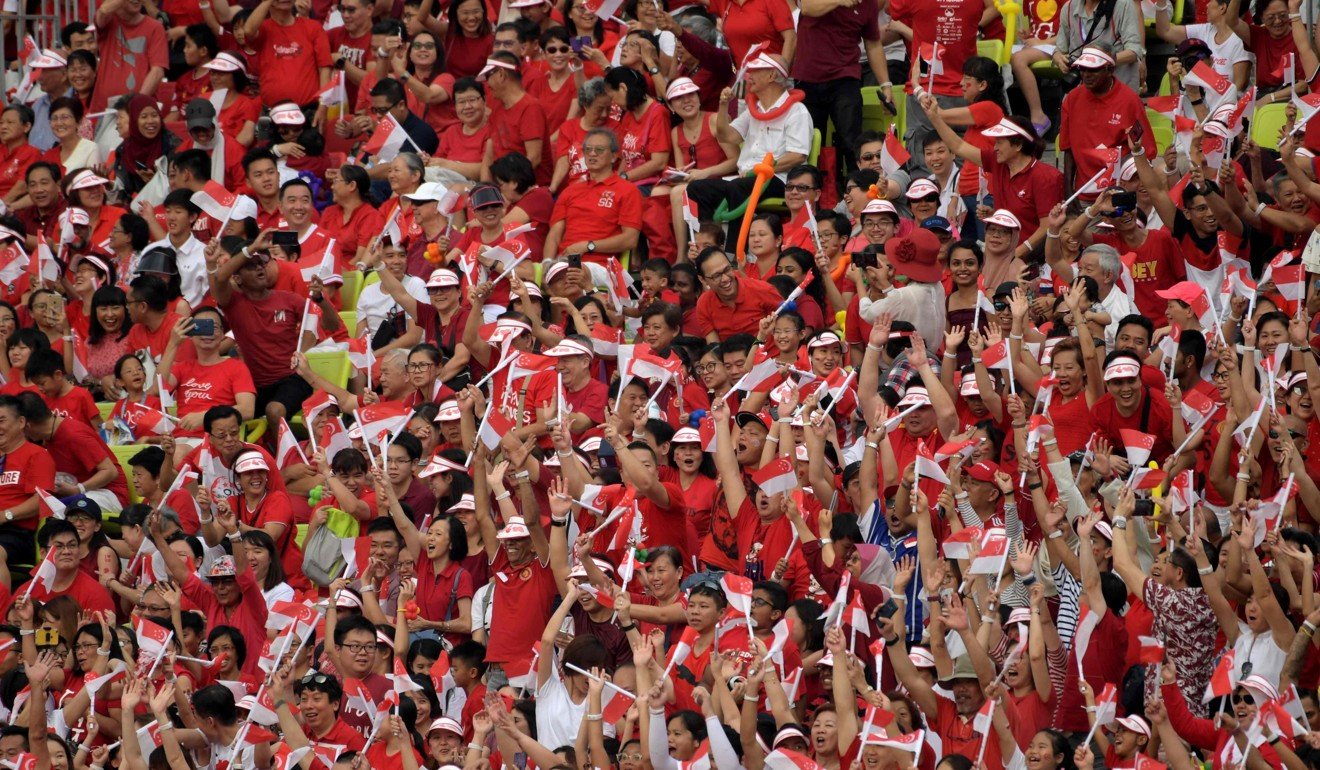- Joined
- Sep 22, 2008
- Messages
- 76,658
- Points
- 113
If Singapore is so wealthy, why do its citizens feel stuck?

Kok Xinghui
Published: 9:00am, 18 Nov, 2019

The skyline along the historic Singapore River. Photo: AFP
Skyscrapers dominate Singapore’s cityscape in a country where home ownership is above 90 per cent, the biggest Silicon Valley firms are setting up shop and the region’s richest park their wealth.
Yet
Singapore
citizens feel stuck in their social classes, according to a survey of 4,015 people aged 18 and above that was conducted between August 2018 and January this year by a state-backed research organisation.
Asked by the Institute of Policy Studies at the National University of Singapore if they felt their financial status would improve in a decade’s time, more than five in 10 said they would experience negligible financial mobility while fewer than one in 10 felt their fortunes would decline.
This pessimism persisted across education levels. Only 44 per cent of those with a degree were hopeful of upward mobility in 10 years’ time, with the figure falling to 40.6 per cent for Singaporeans with vocational training or a polytechnic diploma. For those with a secondary school education or below, such as food deliveryman Alroy Ho, 32, only 23.8 per cent expected to do better in future, with 10.6 per cent thinking they would be worse off.
Advertisement

The financial business district of Raffles Place. Photo: AFP
The findings, released on October 29 in a paper titled Faultlines in Singapore: Public Opinion on their Realities, Management and Consequences, asked respondents for their views on five topics researchers thought could affect social cohesion. These were race, religion, immigration, class, and lesbian, gay, transgender and bisexual issues.
Four out of five Singaporeans interviewed by This Week in Asia said their pessimism boiled down to salaries not matching up to costs, and a sense that wages were stagnant.
https://www.scmp.com/week-asia/poli...cooter-footpath-ban-puts-brakes-food-delivery

Ho, who did not complete secondary school, uses an e-scooter for his work and takes home between S$2,000 and S$3,000 a month, depending on the number of deliveries he makes. With the government now banning such mobility devices on footpaths, he may have to get a motorbike licence and buy a bike to continue at his job. This stretches his already thin finances supporting a wife and a five-year-old and getting a new three-room flat next year.
“I really don’t know what will happen 10 years later. You ask me to look at just the next two years, and I also don’t know how to survive,” he said. “It’s a very rich country but it’s progressing way too fast, not everyone can catch up with the progression.”

Many older Singaporeans have benefited from the strong growth in the nation’s early years. Photo: AFP
Degree holders such as Beatrice B, 24, who writes for a magazine, also feel the pinch. She takes home less than S$3,000 a month and is paying off a student loan of S$28,700 after her four-year bachelor of arts in literature course. She tries to be optimistic about her future, but the cost of living is high and her pay seems stagnant. “I feel stifled,” she said.
She lives with her parents in their four-room flat “out of necessity” and wishes her industry could pay her more because of the “sheer amount of work”.
In ageing Singapore, the Sandwich Generation is feeling the squeeze
Nur Ain Hamid, 31, who has vocational training from the Institute of Technical Education but is currently unemployed, is more hopeful. The single mother of four children aged three to 10 is remarrying soon, with her new husband working as a technician.
Nur and her children now live with her sister and brother, who have health and disability issues, in a three-room flat that is fully paid for. They get by on S$1,050 a month from her brother’s disability welfare and her sister’s Central Provident Fund withdrawals. She expects that after moving out, returning to the workforce and with her children growing up and becoming self-sufficient, her life will improve. Even then, she said it was not about becoming rich but preventing being poor. “Now if my children fall sick also jialat,” she said, using a colloquial term to refer to a dire situation.

Home ownership in Singapore is above 90 per cent. Photo: Bloomberg
Asked to put their finger on why there is a sense of general malaise about the future, scholars such as Irene Ng from the National University of Singapore (NUS) said this was the inevitable result of a maturing economy.
Ng, an associate professor of social work, said: “The era of miracle growth is over, and the widespread universal policies of mass housing and mass education in the past have given way to greater stratification, even in these public goods of housing and education.”
From independence in 1965 to 1973, the average annual growth of real gross domestic product was 12.7 per cent. Even when growth slowed from 1973 to 1979, it still averaged 8.7 per cent. In recent years, growth has averaged 3 per cent and, this year, with the economy buffeted by the US-China tariff war, annual growth is expected to be under 1 per cent.
“If we are lucky, we should be above zero but the momentum has substantially diminished,” Prime Minister Lee Hsien Loong said at a conference in October.
In wealthy Singapore, about 1,000 people sleep rough every night
Some older Singapore citizens, such as Tan Teng Nging’s father, have benefited from the economic growth in the earlier years: the man went from a village in the 1970s where he did not even own a pair of shoes to getting a university education, enabling the family to move into a five-room flat in the mid-1970s when his wife was expecting Tan. “Growing up, my parents kept telling us that by the time it hit my generation it would be impossible to experience the kind of wealth growth they had,” said Tan, 43, who is a life coach pursuing her second postgraduate degree.
‘AN ESCALATOR CARRYING EVERYONE UP’
The problems, it seems, are structural.
NUS sociologist Tan Ern Ser said that in the 1970s and 1980s, many people lifted themselves into the middle class but these days degrees carried less of a premium and the economy faced digital disruption, turbulence and uncertainties.
“It is not surprising that people now feel it is harder to move ahead from where they are now – which is not poverty, as in the past,” he said. “The government has its work cut out for it.”
Senior minister Tharman Shanmugaratnam said last year that this issue would become more challenging because of the country’s past success. “Because those who succeed try to help their children, and those who haven’t succeeded find that the odds increase against them doing well in life,” he said.
Likening social mobility to an escalator, Tharman said: “Once that escalator stops, that escalator that carries everyone up stops, the problems of inequality and all the problems of me against you, this group against that group, become much sharper.”

Singaporeans mark their 54th National Day in August. Photo: AFP
Since May last year, the government has made addressing inequality a priority. It has been making policy tweaks to level the playing field and give disadvantaged Singaporeans a leg up. There is the KidSTART programme, for example, which helps low-income families in various aspects, from nutrition to child development and parent-child interaction.
In the coming years, the government will more than double its annual S$1 billion spending on early childhood education. It is also phasing out the streaming system in schools, bumping up financial help for the poor, and keeping a lid on public housing prices.
The Ministry of Social and Family Development said last year that Singapore had done better than most countries at social mobility. For example, nine in 10 students from the bottom 20 per cent of households by income made it to postsecondary education, up from five in 10 students 15 years ago.
Brits’ male prostitute habit: real target of Singapore’s anti-gay law?
Last month, the Ministry of Finance also released a report on socio-economic outcomes across generations.
It compared Singaporeans in their 40s to earlier cohorts and found that those in their 40s today are “more educated, better able to find jobs, earn more, save more, and live longer and healthier years”.
Still, it matters if Singaporeans feel stuck in their social classes. Ng said Singaporeans’ social compact with the government was that it would “support us to help ourselves”. If a segment of society felt they could not advance despite hard work, this compact became fragile, she said.
In fact, 37.2 per cent of the 3,867 respondents in the survey indicated that if socio-economic issues were mismanaged, it could lead to lower levels of trust in the government.
We could mobility-test every national policy, to link outcomes of policies to their effects on mobilityIrene Ng, NUS associate professor of social work
Experts said that beyond fixing the hardware of equal opportunities and access to education, jobs and housing, there should also be more choices and pathways so people could define mobility outside which schools they attended, and where they lived.
Tan said Singaporeans must find the system fair and that those who had fallen behind were taken care of.
Assistant professor Ng Kok Hoe, from the Lee Kuan Yew School of Public Policy at NUS, said that if public policies were thought to be “more of the same”, it would lead to frustration and pessimism.
Irene Ng suggested the government revisit policies to re-equalise opportunities. “We could mobility-test every national policy, to link outcomes of policies to their effects on mobility,” she said.
Nanyang Technological University sociologist Teo You Yenn said workplace practices, housing policies and health-care infrastructure had to shift so that people were properly rewarded for their contributions, whatever their relative socio-economic status.
For Tan, a shift in the national psyche is also necessary – away from the Singapore Dream of upward mobility. “Forsake the idea that we are on a travelator, let alone an escalator,” he said.
Singaporeans could look overseas or start their own businesses, Tan added.
“Perhaps, more importantly, they have to determine what is a ‘good enough’ life for them, characterised by contentment, peace, and sanity.” ■
- More than half believe they will experience little financial mobility over the next decade, according to a survey
- Experts say that with the era of miracle growth in the past, it may be time to rethink priorities

Kok Xinghui
Published: 9:00am, 18 Nov, 2019

The skyline along the historic Singapore River. Photo: AFP
Skyscrapers dominate Singapore’s cityscape in a country where home ownership is above 90 per cent, the biggest Silicon Valley firms are setting up shop and the region’s richest park their wealth.
Yet
Singapore
citizens feel stuck in their social classes, according to a survey of 4,015 people aged 18 and above that was conducted between August 2018 and January this year by a state-backed research organisation.
Asked by the Institute of Policy Studies at the National University of Singapore if they felt their financial status would improve in a decade’s time, more than five in 10 said they would experience negligible financial mobility while fewer than one in 10 felt their fortunes would decline.
This pessimism persisted across education levels. Only 44 per cent of those with a degree were hopeful of upward mobility in 10 years’ time, with the figure falling to 40.6 per cent for Singaporeans with vocational training or a polytechnic diploma. For those with a secondary school education or below, such as food deliveryman Alroy Ho, 32, only 23.8 per cent expected to do better in future, with 10.6 per cent thinking they would be worse off.
Advertisement

The financial business district of Raffles Place. Photo: AFP
The findings, released on October 29 in a paper titled Faultlines in Singapore: Public Opinion on their Realities, Management and Consequences, asked respondents for their views on five topics researchers thought could affect social cohesion. These were race, religion, immigration, class, and lesbian, gay, transgender and bisexual issues.
Four out of five Singaporeans interviewed by This Week in Asia said their pessimism boiled down to salaries not matching up to costs, and a sense that wages were stagnant.
https://www.scmp.com/week-asia/poli...cooter-footpath-ban-puts-brakes-food-delivery
Ho, who did not complete secondary school, uses an e-scooter for his work and takes home between S$2,000 and S$3,000 a month, depending on the number of deliveries he makes. With the government now banning such mobility devices on footpaths, he may have to get a motorbike licence and buy a bike to continue at his job. This stretches his already thin finances supporting a wife and a five-year-old and getting a new three-room flat next year.
“I really don’t know what will happen 10 years later. You ask me to look at just the next two years, and I also don’t know how to survive,” he said. “It’s a very rich country but it’s progressing way too fast, not everyone can catch up with the progression.”

Many older Singaporeans have benefited from the strong growth in the nation’s early years. Photo: AFP
Degree holders such as Beatrice B, 24, who writes for a magazine, also feel the pinch. She takes home less than S$3,000 a month and is paying off a student loan of S$28,700 after her four-year bachelor of arts in literature course. She tries to be optimistic about her future, but the cost of living is high and her pay seems stagnant. “I feel stifled,” she said.
She lives with her parents in their four-room flat “out of necessity” and wishes her industry could pay her more because of the “sheer amount of work”.
In ageing Singapore, the Sandwich Generation is feeling the squeeze
Nur Ain Hamid, 31, who has vocational training from the Institute of Technical Education but is currently unemployed, is more hopeful. The single mother of four children aged three to 10 is remarrying soon, with her new husband working as a technician.
Nur and her children now live with her sister and brother, who have health and disability issues, in a three-room flat that is fully paid for. They get by on S$1,050 a month from her brother’s disability welfare and her sister’s Central Provident Fund withdrawals. She expects that after moving out, returning to the workforce and with her children growing up and becoming self-sufficient, her life will improve. Even then, she said it was not about becoming rich but preventing being poor. “Now if my children fall sick also jialat,” she said, using a colloquial term to refer to a dire situation.

Home ownership in Singapore is above 90 per cent. Photo: Bloomberg
Asked to put their finger on why there is a sense of general malaise about the future, scholars such as Irene Ng from the National University of Singapore (NUS) said this was the inevitable result of a maturing economy.
Ng, an associate professor of social work, said: “The era of miracle growth is over, and the widespread universal policies of mass housing and mass education in the past have given way to greater stratification, even in these public goods of housing and education.”
From independence in 1965 to 1973, the average annual growth of real gross domestic product was 12.7 per cent. Even when growth slowed from 1973 to 1979, it still averaged 8.7 per cent. In recent years, growth has averaged 3 per cent and, this year, with the economy buffeted by the US-China tariff war, annual growth is expected to be under 1 per cent.
“If we are lucky, we should be above zero but the momentum has substantially diminished,” Prime Minister Lee Hsien Loong said at a conference in October.
In wealthy Singapore, about 1,000 people sleep rough every night
Some older Singapore citizens, such as Tan Teng Nging’s father, have benefited from the economic growth in the earlier years: the man went from a village in the 1970s where he did not even own a pair of shoes to getting a university education, enabling the family to move into a five-room flat in the mid-1970s when his wife was expecting Tan. “Growing up, my parents kept telling us that by the time it hit my generation it would be impossible to experience the kind of wealth growth they had,” said Tan, 43, who is a life coach pursuing her second postgraduate degree.
‘AN ESCALATOR CARRYING EVERYONE UP’
The problems, it seems, are structural.
NUS sociologist Tan Ern Ser said that in the 1970s and 1980s, many people lifted themselves into the middle class but these days degrees carried less of a premium and the economy faced digital disruption, turbulence and uncertainties.
“It is not surprising that people now feel it is harder to move ahead from where they are now – which is not poverty, as in the past,” he said. “The government has its work cut out for it.”
Senior minister Tharman Shanmugaratnam said last year that this issue would become more challenging because of the country’s past success. “Because those who succeed try to help their children, and those who haven’t succeeded find that the odds increase against them doing well in life,” he said.
Likening social mobility to an escalator, Tharman said: “Once that escalator stops, that escalator that carries everyone up stops, the problems of inequality and all the problems of me against you, this group against that group, become much sharper.”

Singaporeans mark their 54th National Day in August. Photo: AFP
Since May last year, the government has made addressing inequality a priority. It has been making policy tweaks to level the playing field and give disadvantaged Singaporeans a leg up. There is the KidSTART programme, for example, which helps low-income families in various aspects, from nutrition to child development and parent-child interaction.
In the coming years, the government will more than double its annual S$1 billion spending on early childhood education. It is also phasing out the streaming system in schools, bumping up financial help for the poor, and keeping a lid on public housing prices.
The Ministry of Social and Family Development said last year that Singapore had done better than most countries at social mobility. For example, nine in 10 students from the bottom 20 per cent of households by income made it to postsecondary education, up from five in 10 students 15 years ago.
Brits’ male prostitute habit: real target of Singapore’s anti-gay law?
Last month, the Ministry of Finance also released a report on socio-economic outcomes across generations.
It compared Singaporeans in their 40s to earlier cohorts and found that those in their 40s today are “more educated, better able to find jobs, earn more, save more, and live longer and healthier years”.
Still, it matters if Singaporeans feel stuck in their social classes. Ng said Singaporeans’ social compact with the government was that it would “support us to help ourselves”. If a segment of society felt they could not advance despite hard work, this compact became fragile, she said.
In fact, 37.2 per cent of the 3,867 respondents in the survey indicated that if socio-economic issues were mismanaged, it could lead to lower levels of trust in the government.
We could mobility-test every national policy, to link outcomes of policies to their effects on mobilityIrene Ng, NUS associate professor of social work
Experts said that beyond fixing the hardware of equal opportunities and access to education, jobs and housing, there should also be more choices and pathways so people could define mobility outside which schools they attended, and where they lived.
Tan said Singaporeans must find the system fair and that those who had fallen behind were taken care of.
Assistant professor Ng Kok Hoe, from the Lee Kuan Yew School of Public Policy at NUS, said that if public policies were thought to be “more of the same”, it would lead to frustration and pessimism.
Irene Ng suggested the government revisit policies to re-equalise opportunities. “We could mobility-test every national policy, to link outcomes of policies to their effects on mobility,” she said.
Nanyang Technological University sociologist Teo You Yenn said workplace practices, housing policies and health-care infrastructure had to shift so that people were properly rewarded for their contributions, whatever their relative socio-economic status.
For Tan, a shift in the national psyche is also necessary – away from the Singapore Dream of upward mobility. “Forsake the idea that we are on a travelator, let alone an escalator,” he said.
Singaporeans could look overseas or start their own businesses, Tan added.
“Perhaps, more importantly, they have to determine what is a ‘good enough’ life for them, characterised by contentment, peace, and sanity.” ■
